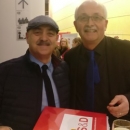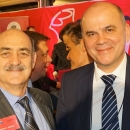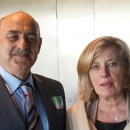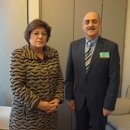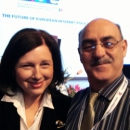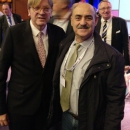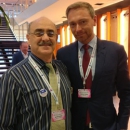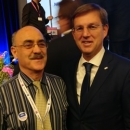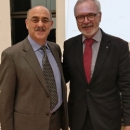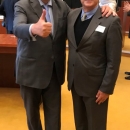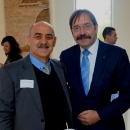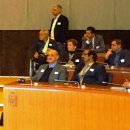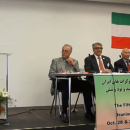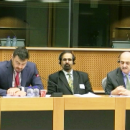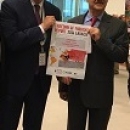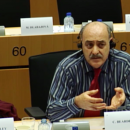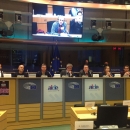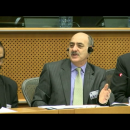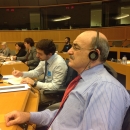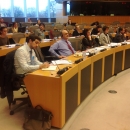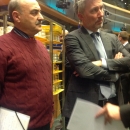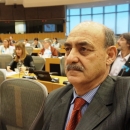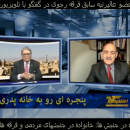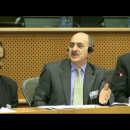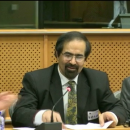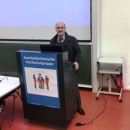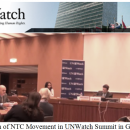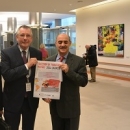Why Trump’s Iran strategy will backfire
Last week, with a cinematic flourish, President Trump foreshadowed his administration’s latest punitive measures against Iran with a tweet echoing HBO’s “Game of Thrones.” “Sanctions are coming,” it declared — much to the cable network’s chagrin.
On Monday, Secretary of State Mike Pompeo and Treasury Secretary Steven Mnuchin followed through, confirming that the United States was applying sanctions to vital parts of Iran’s economy, including its energy and shipping sectors. They targeted more than 700 Iranian individuals, banks, aircraft and maritime vessels, all with the explicit goal of ultimately reducing Iran’s oil exports to zero. Foreign companies and governments that seek to circumvent these measures risk being sanctioned themselves.
For the Trump administration, which unilaterally withdrew from the Iran nuclear deal earlier this year, it is the start of another campaign of “maximum pressure” on what it views as a rogue regime. Hawks in the White House and Trump’s Cabinet believe the sanctions will change Iran’s behavior in the region. They have embarked on this course with the enthusiastic support of Israel and the Persian Gulf monarchies, all of whom want to see Iran forced to scale back support for its proxies throughout the Middle East.
“The Iranian regime has a choice: It can either do a 180-degree turn from its outlaw course of action and act like a normal country, or it can see its economy crumble,” Pompeo said on Monday.
But Trump’s opponents argue the administration’s strategy will punish ordinary Iranians while doing nothing to persuade their rulers. In the months since the White House pulled out of the nuclear accord, the Iranian economy has gone stagnant and its currency has tanked. Major multinational companies have either quit the country or extensively drawn down their operations out of fear of incurring U.S. penalties.
The International Crisis Group analyzed four decades of data on Iran’s economic performance and found there was little correlation between its national-security policies and economic distress. “The Trump administration hopes that sanctions will force Iran to curb its regional activities. But data shows that outcome is uncertain as changes in Iran’s wealth have had little impact on the direction or capabilities of its regional policy,” the group noted in a report.
“Like much of Trump’s foreign policy walking from Iran accord/piling on sanctions is great politics but not great policy,” tweeted Aaron David Miller, a former U.S. diplomat, pointing to the vast difference between the administration’s zeal to punish Iran and its willingness to accommodate North Korea. “The Iranian regime is a bad one; but only Trump can praise [North Korea’s Kim Jong Un] — a true authoritarian and threatening nuclear power — and not see hypocrisy in his Iran policy.”
Meanwhile, Iran’s leadership highlighted its continued adherence to the terms of the nuclear deal and decried the “illegality” of American actions. The European governments that signed the pact have also rallied in its defense. “Our collective resolve to complete this work is unwavering,” said diplomats from the European Union, Britain, France and Germany in a joint statement. Iranian President Hassan Rouhani, who pushed for the deal after his election in 2014, vowed on Monday to “proudly break the sanctions.”
“Iran is gaining ground in the region, and I don’t see these sanctions as reversing that,” said Jeffrey Feltman, a top State Department official on Middle East issues during the Obama administration, to the Wall Street Journal.
In fact, the sanctions may help Iran’s hard-liners more than anyone. Analysts contend that the Iranian regime itself is well-insulated from the economic turmoil, and that its powerful Revolutionary Guard — the organization that also runs much of Iran’s “malign activities” in countries like Iraq and Syria — won’t let the sanctions change its posture elsewhere. Indeed, it may feel emboldened to assert itself all the more in defiance.
As the International Crisis Group pointed out, the sanctions “risk empowering harder-line officials in the Islamic Republic and prompting them to lash out, exacerbating regional tensions.” That’s a fear shared by the U.S.’s European allies, who see Rouhani cowed by hard-line forces within the regime that never wanted rapprochement with the West.
In a phone call with reporters last week, Dennis Ross, a former U.S. diplomat who served three administrations, argued that the Obama administration had a far more extensive international coalition in place when it applied economic pressure on the Iranians a half-decade ago. That is not quite the case now, with the European Union exploring ways to shield European business with Iran from American censure — and Washington already issuing waivers to eight countries, including China and India, to carry on importing Iranian oil.
“The Obama administration had a broad international consensus and coalition that worked hand in hand to ensure there wouldn’t be evasion of the sanctioned regime,” Ross said. “The Iranians are highly skilled in finding ways to evade the sanctions regime and we are not going to have a large number of partners who are going to be as vigilant as they might have been.”
Trump, experts say, may still be hoping for a repeat of his Singapore summit with North Korean leader Kim Jong Un. The Iranians, though, have shown no interest in treating with this U.S. president and may be intent on bunkering down and waiting out his presidency.
“Tehran played by the rules and the United States broke its promises,” wrote John Glaser of the libertarian Cato Institute. “They are not about to willingly pie themselves in the face again in response to new economic sanctions.”
Meanwhile, ordinary Iranians will face the daily toll of sanctions: the shortages of life-saving medicines, the rising costs of basic goods, the steady degradation of the quality of their lives.
“Today, ordinary Iranians are struggling to answer the question of why sanctions are being re-imposed and why they must suffer,” wrote Iran analyst Esfandyar Batmanghelidj. “The inevitability of this suffering, and its quotidian dimension, is what makes the U.S. financial war so pernicious.”
• Here’s more detail from the Crisis Group on the lack of a link between Iran’s economic performance and its behavior:
“As evidence that economic downturns do not necessarily curb Iranian regional activism, the most telling period is 2011-2015… A stifling web of multilateral and international sanctions inflicted maximal harm on the country’s economy, which shrank at the rate of 7.7 per cent in 2012 as oil exports declined by half, the currency fell by 200 per cent and inflation rose to almost 40 per cent. Yet this period coincided with what many consider the most significant expansion of Iran’s military intervention in the region, a product of the uprising in Syria, Tehran’s growing rivalry with Riyadh and the fight against the Islamic State.
”According to the Stockholm International Peace Research Institute, Iran’s arm transfers to allies in Syria and Iraq peaked in this period. Resource scarcity at home neither prevented Iran from extending a multibillion line of credit to Damascus nor from mobilizing Shiite militias from Afghanistan, Pakistan and Iraq to fight in Syria. Iran also stepped up its support for Yemen’s Houthi rebels, training and equipping them.”
• My colleagues Erin Cunningham and Carol Morello report on the Iranian reaction to the sanctions:
“We have to make Americans understand that they cannot talk to the great Iranian nation with the language of pressure and sanctions,” Rouhani said Monday in televised remarks.
”He spoke to a meeting of economists, who he said were at the ‘forefront of the resistance’ against the United States.
”‘What the Americans are doing today is putting pressure merely on the people,’ he said, according to a transcript of the remarks posted on the president’s website…
”The most significant of the new measures is a prohibition against oil sales, which provide Tehran with 80 percent of its revenue.
”The blacklisted companies include 50 Iranian banks, an Iranian airline and dozens of its planes, as well as officials and vessels in Iran’s shipping and energy sectors.
”President Trump withdrew from the 2015 nuclear deal in May and gave nations and businesses 180 days to wind down their oil purchases to ’zero.’ The administration has provided waivers to eight nations that have significantly reduced their oil purchases from Iran but not stopped them entirely.
”Pompeo on Monday identified the countries that have been granted temporary waivers from sanctions to keep buying oil from Iran, though the United States expects them to keep reducing their oil imports in the coming weeks and months. The countries include China’s two biggest oil customers, China and India. Also granted waivers were Italy, Greece, Japan, South Korea, Turkey and Taiwan.”
• It is, of course, election day in the United States. We compiled our explainer series into an article for those who still need to brush up on what’s at stake and how things will work.
• Chinese President Xi Jinping launched a veiled attack on the Trump administration at a major Chinese trade fair on Monday. Xi hardened his tone during a speech welcoming foreign investment and business, alluding to the threat of a trade war with the United States. My colleague Gerry Shih has more:
“’Great winds and storms may upset a pond, but not an ocean,’ Xi said, comparing China to a vast and immovable sea. ‘After 5,000 years of trials and tribulations, China is still here. Looking ahead, China will be here to stay.’
”In his address in Shanghai, closely watched as perhaps the Chinese president’s last major speech on trade before he is set to meet with President Trump for crucial talks later this month in Argentina, a confident Xi gave few signs that he was in the mood to make significant concessions.
”For more than half an hour, Xi hit placating notes, and then steely ones. He made promises to cut tariffs, open up sectors such as health care and education to foreign investment, and import $45 trillion in goods and services over the next 15 years. Then he threw veiled jabs at Trump’s leadership style.
”‘As globalization deepens, the practices of law of jungle and winner-take-all are a dead end,’ he said.”
• My colleagues Kevin Sullivan and Kareem Fahim report on the Saudi royals and elites — perhaps up to 56 men — still detained following a purge launched by the kingdom’s ambitious crown prince, Mohammed bin Salman:
“Somewhere in this kingdom, Prince Turki bin Abdullah is locked away.
”Turki, 47, was once a golden scion of Saudi Arabia’s gilded royal family, a prominent son of former King Abdullah and a fighter pilot with advanced degrees who trained in the United States and Britain. He was the powerful governor of Riyadh province, then chief executive of the multibillion-dollar King Abdullah Foundation, which funds charitable work around the world.
”He is now among an unknown number of superwealthy Saudis who remain detained a full year after Crown Prince Mohammed bin Salman startled his country by turning Riyadh’s posh Ritz-Carlton hotel into a 5-star jail for some of the nation’s most prominent citizens in what he called an anti-corruption sweep.
”Prince Turki, who officials have reportedly accused of graft related to construction of the Riyadh subway, remains detained without any formal charges. His chief of staff, Gen. Ali al-Qahtani, was also arrested and died in detention under circumstances that have never been fully explained.”
President Donald Trump at a campaign rally on Nov. 5 in Cleveland. (Tony Dejak/Associated Press)
Facts second
Today Americans vote in midterm elections. And President Trump is going to great lengths in an effort to keep his opponents from winning. In the campaign’s final days, Trump has painted an astonishingly apocalyptic vision of America under Democratic control, unleashing a torrent of falsehoods and portraying his political opponents as desiring crime, squalor and poverty.
Trump is claiming that Democrats want to erase the nation’s borders and provide sanctuary to drug dealers, human traffickers and MS-13 killers. He is warning that they would destroy the economy, obliterate Medicare and unleash a wave of violent crime that endangers families everywhere. And he is alleging that they would transform the United States into Venezuela with socialism run amok.
Trump has never been hemmed in by fact, fairness or even logic. But at one mega-rally after another, he’s taken his no-boundaries political ethos to a new level — demagoguing the Democrats in a whirl of distortion and using the power of the federal government to amplify his fantastical arguments.
In Columbia, Mo., the president suggested that Democrats “run around like antifa” demonstrators in black uniforms and black helmets, but underneath, they have “this weak little face” and “go back home into mommy’s basement.”
In Huntington, W.Va., Trump called predatory immigrants “the worst scum in the world” but alleged that Democrats welcome them by saying, “Fly right in, folks. Come on in. We don’t care who the hell you are, come on in!”
And in Macon, Ga., he charged that if Democrat Stacey Abrams is elected governor, she would take away the Second Amendment right to bear arms — though as a state official, she would not have the power to change the Constitution.
Trump’s omnipresence has frustrated Democrats, who are attempting to stay focused on their campaign messages of health care and other pocketbook issues.
But for him, this is how it’s done. Trump has had only one formative political experience: His 2016 race for president, which he won against odds by galvanizing his conservative base around nativist themes. Two years later, he is returning to the same playbook.
Still, Trump’s flood of misinformation has swelled to epic proportions in recent weeks, according to an analysis by The Washington Post’s Fact Checker. In the seven weeks leading up to the election, the president made 1,419 false or misleading claims, an average of 30 a day. — Philip Rucker
